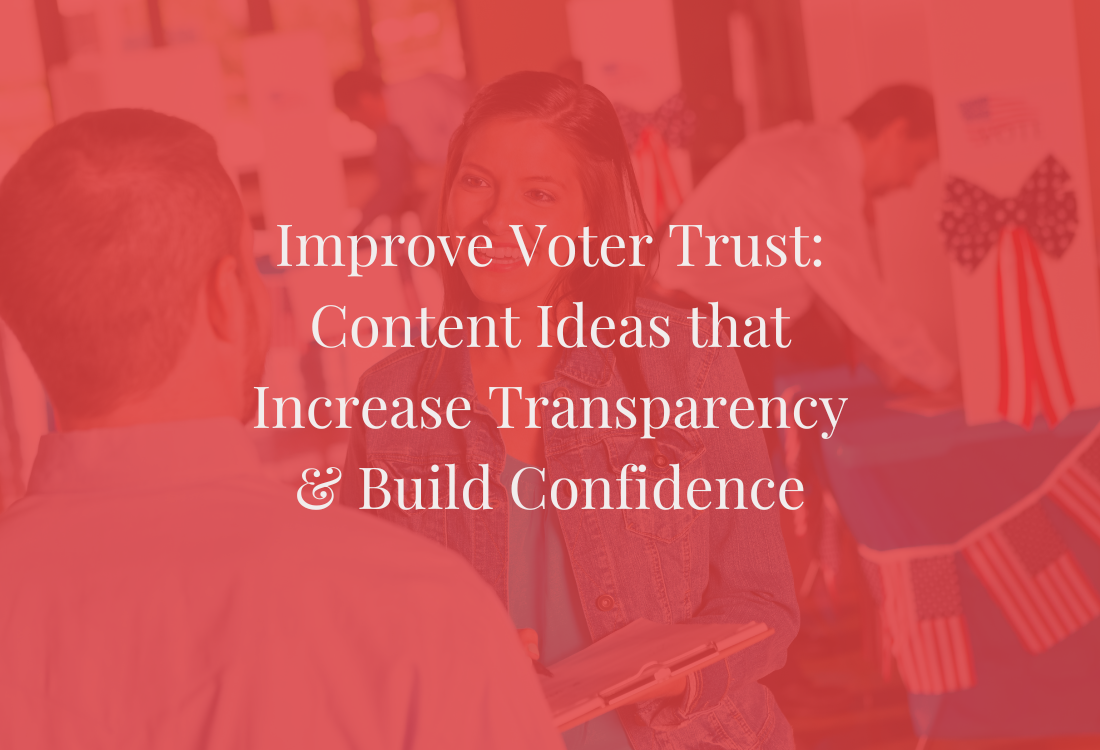Public trust in politicians has been declining steadily over the years. This lack of trust affects voter turnout and overall engagement in the political process. However, politicians can improve voter trust by leveraging their websites to share transparent, comprehensive, and engaging information. This article will explore the types of content that can enhance trust and provide examples of how you can effectively communicate with voters online.
The Importance of Transparency in improving voter trust
Transparency is absolutely crucial in building and maintaining trust with voters. When politicians openly share detailed and accurate information about their policies, background, and activities, it significantly helps voters make well-informed decisions. This openness fosters a sense of reliability and honesty. Voters greatly appreciate when candidates are transparent about their positions and actions, as it reduces the skepticism and cynicism that are often prevalent in the political landscape.
Those of us serving in elected office know that at some point in the future, if it has not already occurred, opponents may make unfounded attacks on our service or character. Having established a digital record of our work, policies, and even some personal information makes this more difficult for them to do. It also makes it much easier for you to refute the misinformation and attacks. Furthermore, being consistently on-brand shows that you are honest and always your true self.
Public Trust in Politicians: A few Statistics
- Pew Research Center: A recent survey revealed that only 20% of Americans trust the government to do what is right most of the time.
- Gallup Poll: In 2023, the approval rating of Congress was at a mere 18%, reflecting widespread dissatisfaction.
- Edelman Trust Barometer: Trust in government experienced a 5% decline globally in 2023, indicating a broader issue of mistrust.
These sobering statistics underscore the critical need for effective strategies to improve voter trust. A well-designed, content-rich website can serve as a powerful and essential tool in this effort. By being transparent and providing ample information, politicians can bridge the gap between themselves and the electorate, fostering a healthier, more trusting relationship.
Transparency, when effectively practiced through a website, helps demystify political processes and decisions, allowing voters to feel more connected and informed about the actions and intentions of their representatives. This level of openness not only builds trust but also encourages greater civic engagement and participation, as voters feel more confident and secure in their understanding of political matters.
While it does take some work, the improved voter confidence in elected officials and the governmental process is worth it. Using the content you create specifically for your website across multiple platforms increases your return on investment and time. Below, I’ll discuss a few ways you can do this.
Sharing Comprehensive Information online improves voter trust
A politician’s campaign website should act as a central hub for all relevant information. By sharing detailed content, politicians can provide clarity and demonstrate accountability. Here are some types of content that can significantly improve voter trust:
1. Biography and Personal Stories
Sharing a politician’s background, personal stories, and journey can humanize them and make them more relatable. Voters want to know who they are voting for beyond just policy positions. A detailed biography can help voters connect on a personal level. Please note that I am not recommending that you over-share private information about your family, particularly minor children. Keep in mind that your website isn’t actually about you; it’s about those who visit it to find information. Share enough personal information to connect with them and show that you are authentic and relatable. Sharing too many details, however, could cause voters to find information that causes them to disagree with you – defeating your original purpose.
2. Policy Positions and Plans
Clearly outlining policy positions and future plans is essential. Voters need to understand where a politician stands on key issues that are important to them. Detailed policy pages, FAQs, and position articles can help voters grasp the nuances of a politician’s agenda. This can also give members of the media some great content to use and they research you online. Serve up to them what you want them to print.
3. Endorsements and Testimonials
Featuring endorsements from respected figures and testimonials from constituents can boost credibility. These endorsements act as third-party validations and can sway undecided voters. Real-life stories from people who have benefitted from your actions are powerful statements.
4. Informational Articles about successful legislation
Constituents don’t trust elected officials if they think they aren’t working hard for them. You can improve voter trust if you share what you’re doing for them and the area you represent. That being said most of your voters are not familiar with typical legislative bill language. Clear, comprehensive explanations of legislation in language non-politicians typically use shows them that you aren’t trying to “pull one over on them.” Instead, it provides an example of your willingness to communicate.
Engaging Voters Through Interactive Content improves trust
Engagement is a critical component of improving voter trust. Interactive content can make a politician’s website more dynamic and user-friendly. Here are some effective interactive content types:
Social Media Integration
Integrating social media feeds on the website keeps content fresh and engaging. It allows voters to see real-time updates and interactions. Social media also offers a platform for voters to engage directly with the candidate.
Surveys and Polls
Conducting surveys and polls on the website allows politicians to gauge public opinion on various issues. It shows a value in voter input and a willingness to listen. This two-way communication is essential for building trust. There are multiple plug-ins or widgets your website designer can use to conduct a poll or survey.
Visual and Multimedia Content improves voter trust
Visual and multimedia content can make information more accessible and engaging. Let the voters see you and what you’re doing as you work for them. Here are some examples of effective visual content:
Videos and Speeches
Posting videos of speeches, interviews, and campaign events can help convey messages more effectively than text alone. Videos allow voters to see and hear the candidate, which can be more persuasive. You can either imbed these videos within a page or article on your website or you can create an entire article (or blog post) around a piece of video content. For example, most state legislatures have a media services office that stream proceedings. Have them isolate speeches, bill presentations, or committee testimony that you can then use online.
Photo Galleries
Sharing photo galleries from campaign events, community service activities, and daily life can humanize you as a politician. It provides a behind-the-scenes look at your work and life.
Infographics and Data Visualizations
Using infographics and data visualizations to explain complex policies can make information more digestible. Visual aids can help break down statistics and data into understandable formats, making it easier for voters to grasp key points.
Building Trust Through Consistent and Authentic Content
Consistency and authenticity are key to improving voter trust. Regularly updating your website with new content and maintaining a consistent message can reinforce your commitment to transparency. Don’t ghost your constituents for most of the year and then bombard them during a campaign. Personally, I’d rather have voters ignore much of what I publish but remember that I’m always around and working for them than to have them think I only show up and care at fundraising time or election season. Be present.
Regular Updates and News
Keeping your website updated with the latest news, press releases, and event schedules shows that you are active and engaged. It also ensures that voters have access to the most current information.
Authentic Communication
Authentic communication means being honest and straightforward with voters. Avoiding political jargon and speaking directly to voters’ concerns can build a stronger connection. Authenticity helps voters feel that you genuinely cares about their issues. Importantly, don’t avoid difficult subjects. Addressing controversial legislation or events honestly shows that you have nothing to hide and respect them as voters.
Conclusion: The Power of Accessible Information in Building Trust
In conclusion, a well-designed and information-rich website is crucial to improve voter trust. By sharing comprehensive information, engaging through interactive content, and maintaining consistent and authentic communication, politicians can significantly enhance their credibility and trustworthiness. The more transparent and accessible a politician is, the more likely they are to gain the trust of the voters. With public trust in politicians at an historic low, leveraging a website to share tons of information and engage with voters is not just beneficial; it’s essential.
Politicians who invest in creating a comprehensive and engaging online presence will find that it pays off in terms of building voter trust and support. As we move further into the digital age, the importance of a robust online presence will only continue to grow. Therefore, embracing these strategies can make a substantial difference in building a trustworthy and successful political campaign.
If you’re an elected official or running for office, we’d love to talk to you about how we can design a campaign website that meets your needs.




